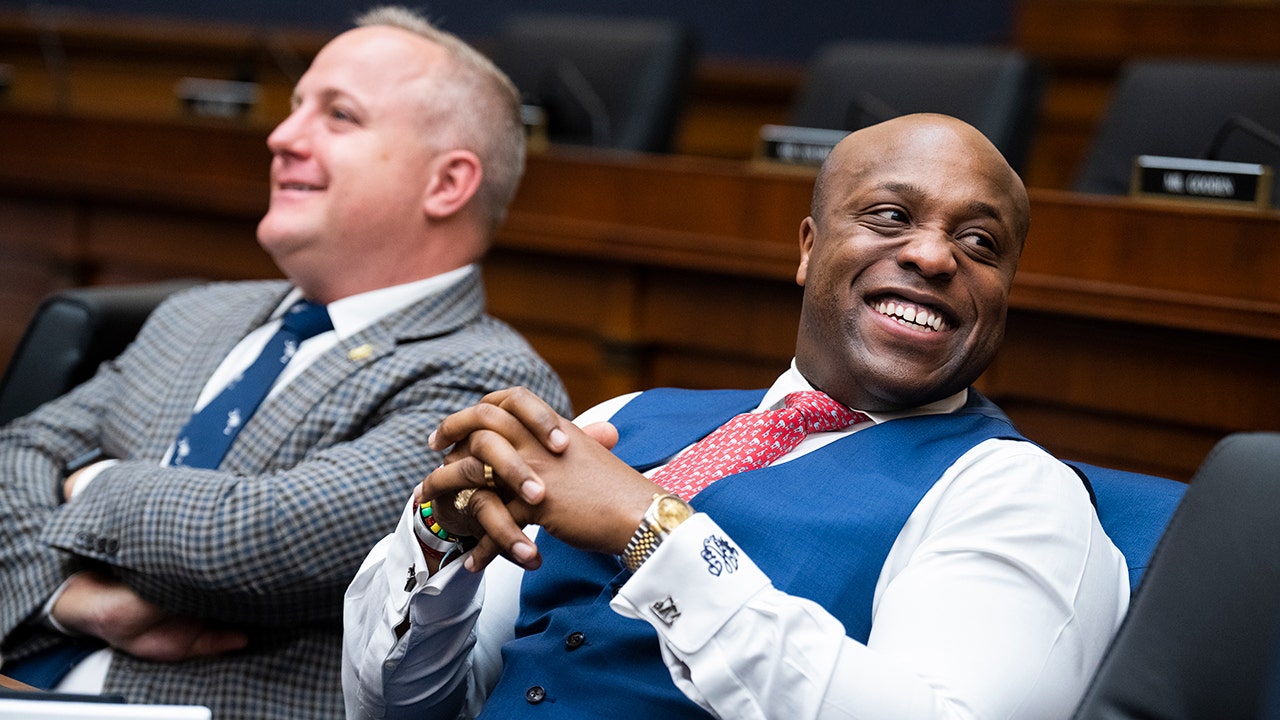World
Ukraine’s Zaluzhny touts drones as path to victory; Russia suffers strikes
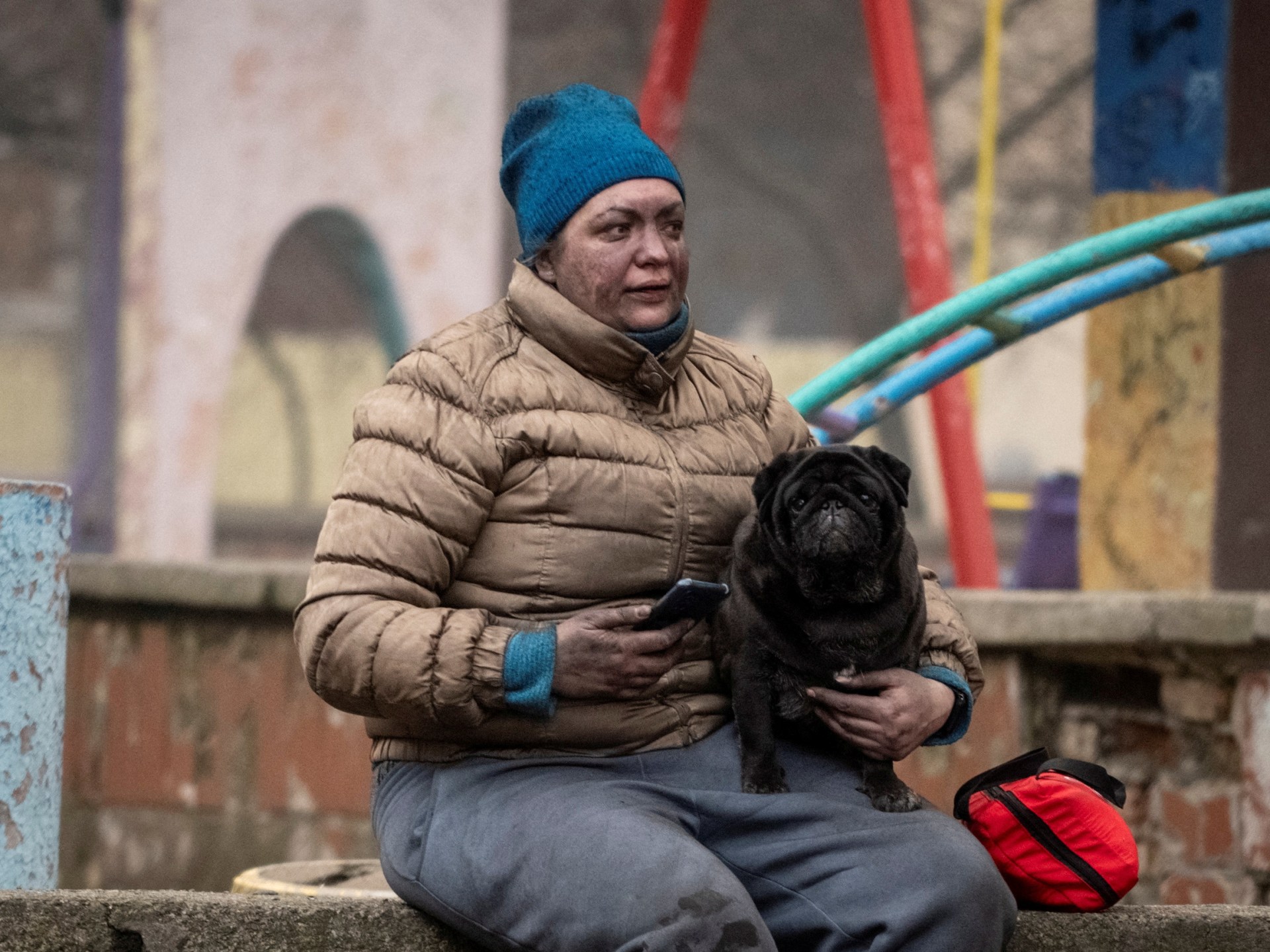
Ukraine’s commander-in-chief has outlined a plan to massively scale up the use of unmanned systems to overcome Russia’s advantages in manpower and materiel and break the deadlock in this war.
The effectiveness of such systems was proved again last week as they sank a Russian missile corvette, grounded three planes and set an oil refinery on fire.
Russia, too, continued to attack Ukraine with drones and missiles, but it failed to capture new territory despite its superior resources and constant assaults on the eastern city of Avdiivka and Ukraine’s stronghold at Krynky on the left bank of the Dnipro River in the Kherson region.
Meanwhile, Ukraine’s Western allies made progress on securing funding for the war.
The European Union finally approved a 50-billion-euro ($63bn) aid package for Ukraine, and the United States Senate unveiled a $118bn bill that includes $60bn for Ukraine.
Zaluzhny’s drone doctrine
“Unmanned systems … are almost the only tool for withdrawing from military operations of a positional form,” Ukrainian commander-in-chief Valerii Zaluzhny wrote in a doctrinal paper on Thursday, because traditional heavy armour and manpower are “increasingly a dream” for Ukraine’s armed forces.
He called for a “completely new state system of technological rearmament” that could “take up to five months”.
Zaluzhny’s new military doctrine dovetailed with the government’s pledge late last year to build 1 million first-person viewer drones and 11,000 medium- and long-range drones this year.
Ukraine has used such systems with devastating effect.
On January 31, Ukraine struck the Belbek airfield in western Crimea.
Russia’s Ministry of Defence said it intercepted 20 air-launched missiles, but Russians in Crimea filmed some of the missiles flying undisturbed directly over dormant air defence systems.
The following day, Ukraine struck Belbek again, this time damaging or destroying three Russian fighter planes on the ground, according to southern forces spokesperson Natalia Humenyuk.
One Russian military reporter described it as a complex, two-day operation targeting three airfields and involving decoy missiles, HARM radar-seeking missiles, Storm Shadow attack missiles and surface drones.
Those surface drones sank a Russian warship near Lake Donuzlav off western Crimea.
Footage released by Ukraine’s armed forces showed them repeatedly striking the Ivanovets, a 480-tonne missile corvette, crippling it and then destroying it in a pair of massive explosions. It was reportedly one of only three still operating in Russia’s Black Sea Fleet.
Ukrainian military intelligence chief Kyrylo Budanov said his service’s drone unit Group 13 sank the Ivanovets using Magura V5 surface drones.
“There were six direct hits to the hull. … The ship overturned on its stern and sank,” he said.
Two days later, Ukraine’s Security Service struck the Rosneft refinery in Volgograd, one of the largest in Russia, apparently using two aerial drones. Footage showed at least four burning oil tanks destroyed.
Budanov said he believes the number of attacks would increase.
“Hypothetically, there is a plan by which all this happens. I believe that this plan includes all the main objects of critical infrastructure and objects of military infrastructure of the Russian Federation,” Budanov said.
Ukrainian air force spokesman Yuri Ignat suggested attacks on Crimea would continue to target airfields.
“Russia uses not only Belbek. About five airfields are actively used for attacks on Ukraine. These are planes of various modifications: MiG-31, … MiG-29, Su-27 and helicopters,” he said.
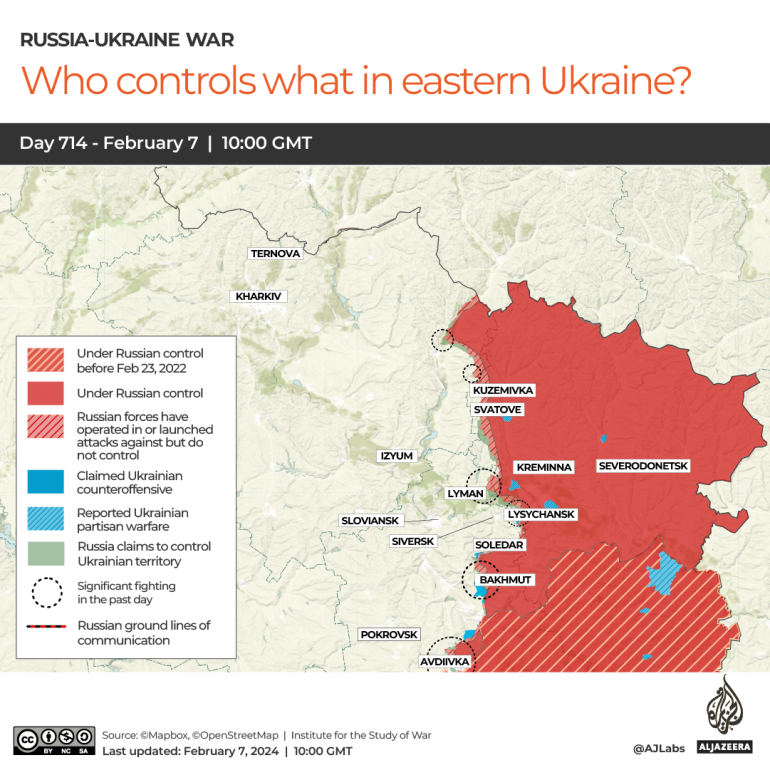
Ukraine has pursued other forms of asymmetric warfare.
Its military intelligence said a Russian Tu-95 bomber, who had reportedly taken part in raids on Ukraine, was shot dead in Russia.
Ukrainian hackers from the Prana Network broke into a Russian Defence Ministry server, stealing documents that revealed Russia had agreed to pay Iran $1.75bn for 6,000 Shahed drones.
Russia kept those drones flying into Ukraine throughout the week, accompanied by missiles.
Ukrainian President Volodymyr Zelenskyy said Dnipropetrovsk was one of Russia’s main targets for those attacks.
“The danger is constant, high. Russia considers the region as one of the main targets for terrorist attacks. It is our enterprises, our economic potential, this region,” he said.
Dnipropetrovsk lies at the heart of Ukraine’s territories on the left bank of the Dnipro River and sits among the contested regions of Kharkiv, Luhansk, Donetsk, Zaporizhia and Kherson.
Help from allies
As if to vindicate Zaluzhny’s turn from conventional battlefield weapons, EU leaders confirmed they would not be able to provide Ukraine with 1 million artillery shells by March as promised.
European foreign policy chief Josep Borrell said 330,000 had been delivered and the number would reach about 524,000 by March.
“By the end of the year, the planned deliveries will reach more than 1 million because the figure in the pipeline amounts to 630,000,” Borrell said.
Some estimates have put Russian artillery shell production capacity at 6 million to 7 million a year. North Korea has reportedly delivered an additional 1 million more shells.
There was some good news for Ukraine on the financial front.
European leaders overcame objections from Hungary to approve 50 billion euros ($54bn) in financial aid for Ukraine over the next four years. The first 4.5 billion euros ($4.85bn) was to arrive in Ukraine in March as part of a total of 18 billion euros ($19bn) for Kyiv this year. That left the EU with 20 billion euros ($21.5bn) in military aid still to approve.
US senators on Sunday released a $118bn national security bill for discussion that included $60bn for Ukraine this year.
US President Joe Biden, a Democrat, requested the sum late last year, but congressional Republicans had tied any Ukraine aid to increased security on the border with Mexico.
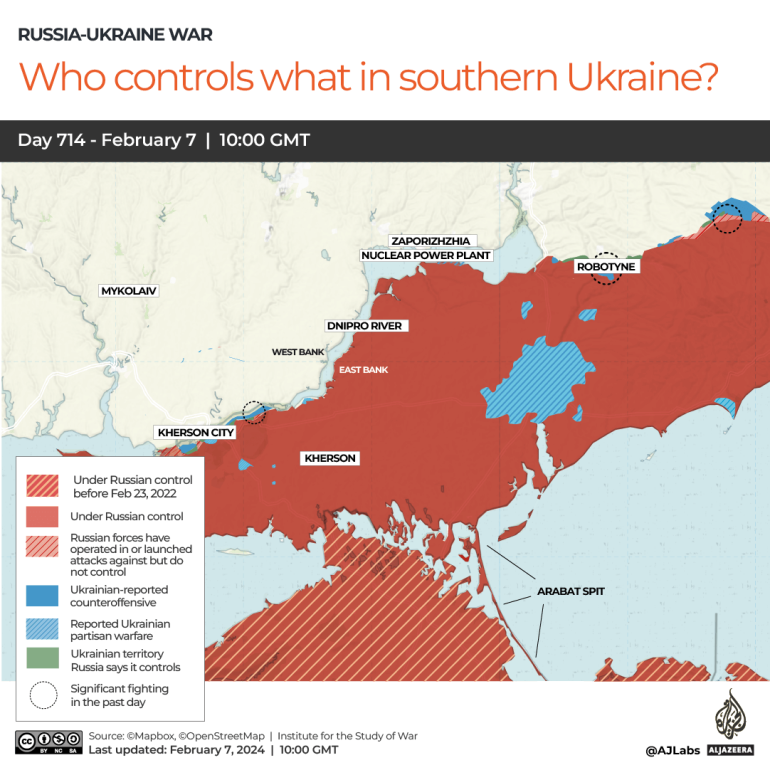
Months of bipartisan negotiations produced sweeping reforms to asylum procedures, presidential parole to migrants and funding for border security.
“Now all indications are this bill won’t even move forward to the Senate floor,” said Biden on Tuesday, blaming Republican presidential hopeful Donald Trump.
“He’s done nothing, I’m told, than reach out to Republicans in the House and Senate and threaten and intimidate them to vote against this proposal. And it looks like they’re caving, but they owe it to the American people to show some spine,” Biden said in a White House briefing.
Despite leading Ukraine’s armed forces to some spectacular successes, there was speculation that Zaluzhny was due to be replaced after Zelenskyy hinted at major changes in an interview that aired on Sunday night.
“A reset, a new beginning is necessary,” Zelenskyy told Italy’s state television Rai News.
“If we want to win, we must all push in the same direction, convinced of victory. We cannot be discouraged, let our arms fall. … That’s why I’m talking about restarting, replacement. I have something serious in mind, which is not about a single person but about the direction of the country’s leadership,” Zelenskyy said.


World
Israeli tanks push deeper into Rafah; battles rage in northern Gaza

World
Former Gambian interior minister sentenced for crimes against humanity by Swiss court
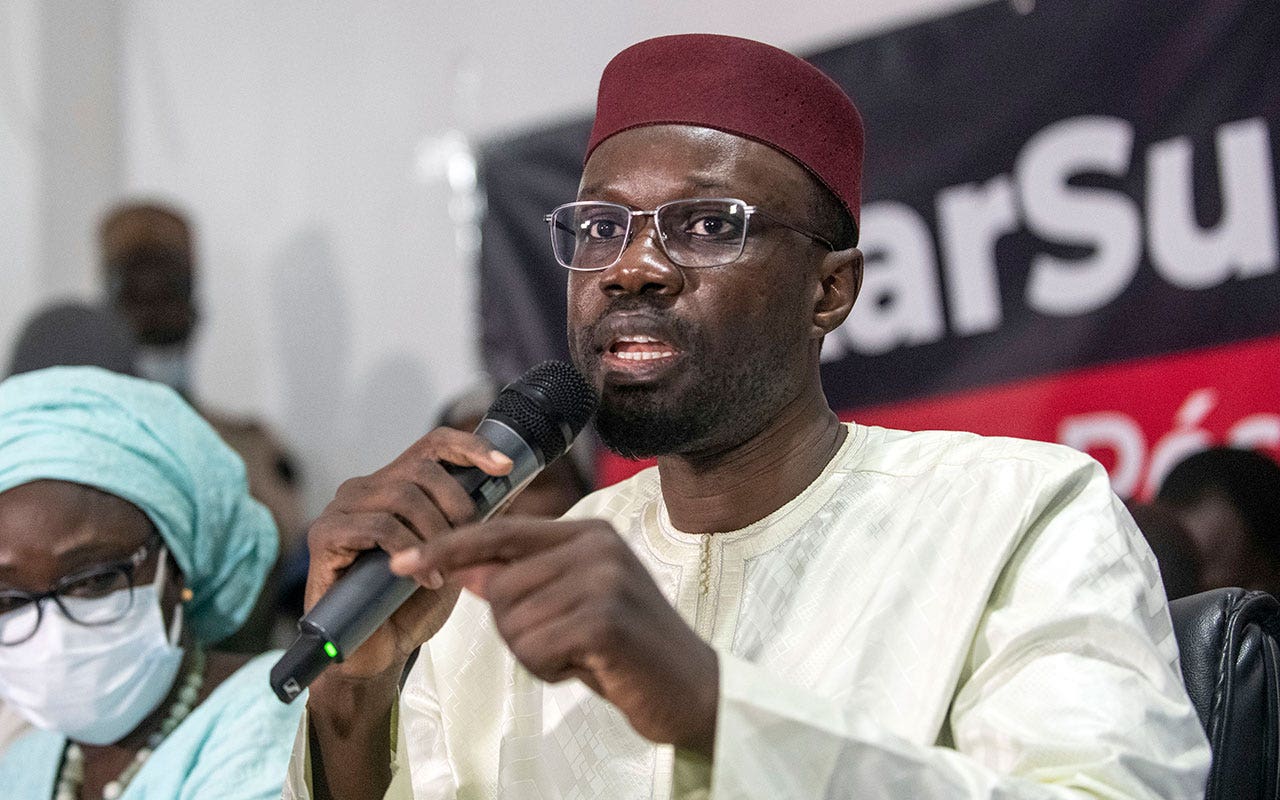
- Switzerland’s top criminal court convicted former Gambian Interior Minister Ousman Sonko of crimes against humanity.
- Sonko has been sentenced to 20 years in prison for his role in repression under ex-dictator Yahya Jammeh.
- Sonko, who served from 2006 to 2016, faced charges including homicide, torture and false imprisonment.
Switzerland’s top criminal court on Wednesday convicted a former interior minister of Gambia for crimes against humanity and sentenced him to 20 years over his role in repression committed by the west African country’s security forces under its longtime dictator, a legal advocacy group said.
Prosecutors had been seeking a life sentence for Ousman Sonko, Gambia’s interior minister from 2006 to 2016 under then-President Yahya Jammeh, TRIAL International said.
The Federal Criminal Court in the southern town of Bellinzona ruled that Sonko’s crimes — including homicide, torture and false imprisonment — amounted to crimes against humanity. However, they did not rise to “aggravated” cases that could have brought the maximum penalty of life behind bars, according to several lawyers who attended the trial.
SENEGAL’S OPPOSITION LEADER OUSMANE SONKO TO ADDRESS SUPPORTERS AFTER MONTHS IN PRISON
The trial, which began in January, was hailed by advocacy groups as a watershed application of the principle of “universal jurisdiction,” which allows for the prosecution of serious crimes committed abroad.
Legal advocacy group TRIAL International said on Wednesday that Ousman Sonko, pictured above, has been sentenced to 20 years in prison. (AP Photo/Sylvain Cherkaoui, File)
Activists and legal experts say the verdict could send a message to Jammeh, who fled Gambia and remains in exile in Equatorial Guinea.
Sonko, who was in the courtroom for Wednesday’s reading of the verdict, offered little reaction when a translation was read out in English, said TRIAL International’s legal adviser Benoit Meystre, who also attended the proceedings.
Sonko applied for asylum in Switzerland in November 2016 and was arrested two months later. The Swiss attorney general’s office said his indictment, filed a year ago, covered alleged crimes during 16 years under Jammeh, whose rule was marked by arbitrary detention, sexual abuse and extrajudicial killings.
TOP SENEGALESE OPPOSITION LEADER FREED FROM JAIL AS ELECTION NEARS
Sonko was accused of supporting, participating in and failing to stop attacks against opponents in Gambia, an English-speaking West African country surrounded by neighboring Senegal. The crimes included killings, torture, rape and numerous unlawful detentions, prosecutors said.
“This unprecedented conviction based on universal jurisdiction in Europe is the confirmation that no one is above the reach of justice,” Meystre said in a text message. “Even the most powerful figures can be brought to account for their participation in mass atrocities.”
Madi MK Ceesay, an award-winning journalist who was once arrested under Sonko’s orders and who testified in the trial, told The Associated Press the proceedings showed that “no matter what, the long arm of justice can always catch the perpetrator.”
Reed Brody, an American human rights lawyer who attended the trial, said Sonko’s conviction was a pivotal step toward justice for Jammeh’s victims.
“The long arm of the law is catching up with Yahya Jammeh’s accomplices all around the world, and hopefully will soon catch up with Jammeh himself,” he said.
Sonko was convicted of homicide, torture and false imprisonment as crimes against humanity, while rape charges against him were dropped, Brody wrote on X.
Outside the courtroom, Olimatou Sonko, the defendant’s daughter, told Swiss public broadcaster SRF “it isn’t fair” that the full proceedings of the trial weren’t translated to English from German, which her father doesn’t understand.
Philip Grant, executive director at TRIAL International, which filed the Swiss case against Ousman Sonko before his arrest, said he was the highest-level former official ever to be put on trial in Europe under the principle of universal jurisdiction.
Sonko, who joined the Gambian military in 1988, was appointed commander of the State Guard in 2003, a position in which he was responsible for Jammeh’s security, Swiss prosecutors said. He was made inspector general of the Gambian police in 2005.
He was removed as interior minister in September 2016, a few months before the end of Jammeh’s government, and left Gambia to seek asylum in Europe.
Ousman Sonko is not to be confused with leading politician Ousmane Sonko in Senegal, who spells his first name slightly differently.
Jammeh seized control in a 1994 coup. He lost Gambia’s 2016 presidential election but refused to concede defeat to Adama Barrow, and ultimately fled amid threats of a regional military intervention to force him from power.
“The verdict against Ousman Sonko is a milestone in the fight against impunity and a historic success for universal jurisdiction in Switzerland and Europe,” Amnesty Switzerland wrote on X. “Even former ministers can be prosecuted! Victims and their families finally see justice.”
World
EBU woes deepen as political parties excluded from EU election debate
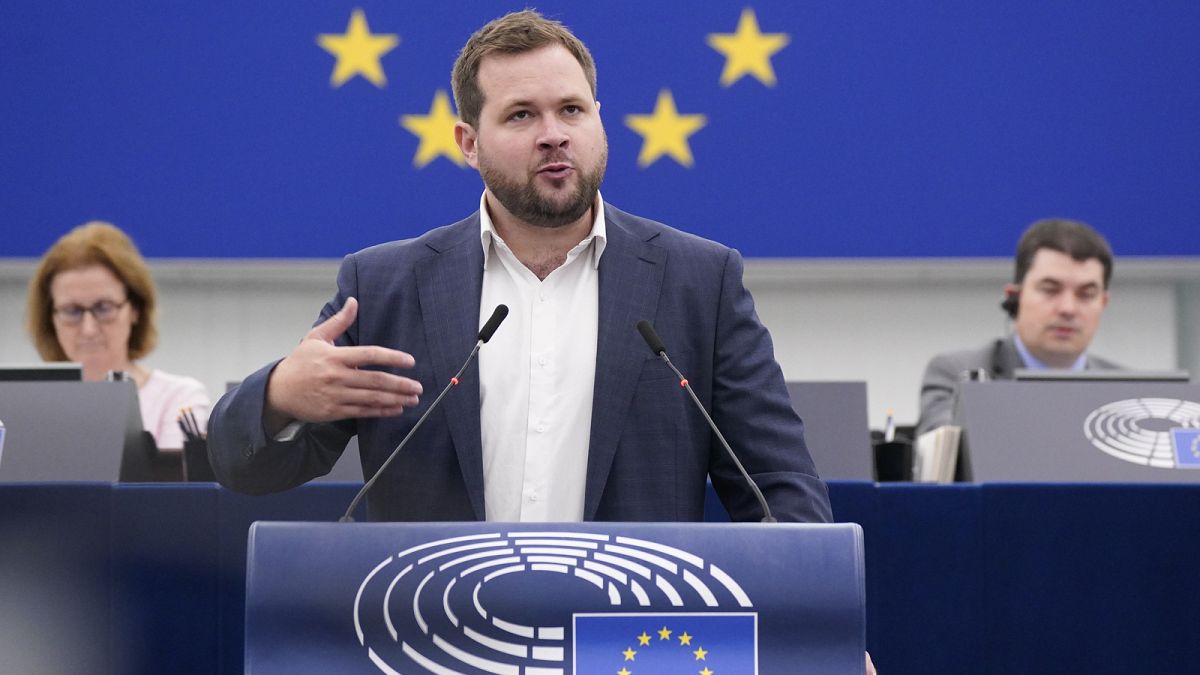
The broadcaster says only parliamentary groups fielding a lead candidate in June’s election can be represented at the televised stand-off.
The European Broadcasting Union (EBU) is under further scrutiny after it was accused by two political parties of excluding them from its Eurovision election debate.
The far-right Identity and Democracy (ID) party and the regionalist, separatist European Free Alliance (EFA) both say they have been intentionally shunned by the organisers of the debate, set to take place at the European Parliament in Brussels on May 23 ahead of June’s European elections.
In correspondence seen by Euronews, the ID Party – which harbours the likes of France’s Rassemblement National, Italy’s Lega and Germany’s Alternative für Deutschland and which forms its own group in the European Parliament – was told by the EBU that it could not be represented at the debate because it had not fielded an official lead candidate, known as Spitzenkandidat, for the ballot.
The Spitzenkandidat process requires all major European parties to select a lead candidate to bid for the role of president of the European Commission, the bloc’s powerful executive arm. But the process has been notoriously spurned in the past, with current president Ursula von der Leyen parachuted to the role in 2019 despite not officially running.
In a letter addressed to European Parliament President Roberta Metsola, also seen by Euronews, the ID group’s co-chairs claim the EBU’s rules are inconsistent. Other parties fielding more than one lead candidate, which ID says also “goes against” the principle of the Spitzenkandidat, have been invited to the debate.
Renew Europe, which is fielding three lead candidates, will be represented by Sandro Gozi, while the Greens, who have two lead candidates, will send Terry Reintke to the televised stand-off.
The EBU says that it sent invitations to parties from the seven political groups in the European Parliament and made clear that the Eurovision debate was a “forum for lead candidates for the position of European Commission President” under the Spitzenkandidat system.
“Two parties, the ECR and ID, declined to nominate a lead candidate and have therefore made themselves ineligible for this particular debate,” the Geneva-based broadcasting union said in a statement shared with Euronews.
ID has urged President Metsola to weigh in and urge the EBU to retract the decision and allow MEP Anders Vistisen of the far-right populist Danish People’s Party to participate on behalf of the group.
The EBU debate is one of three electoral debates taking place ahead of June’s vote. Vistisen represented the ID group in the Maastricht debate held in April while Maylis Roßberg took part on behalf of the EFA.
EFA also criticises its exclusion
The European Free Alliance (EFA), home to Europe’s regionalist and separatist parties, also published a statement on Tuesday alleging it had been deliberately excluded from the debate.
The party sits along with the Greens as part of the Greens/EFA group in the European Parliament. According to the EBU, its rules mean only one candidate from each of the parliament’s seven political groups can take place in the debate, in this case the Greens’ Terry Reintke.
“In coordination with the European Parliament, the EBU invited political parties in the European Parliament to nominate one Lead Candidate from each of the 7 official political groups represented,” the EBU told Euronews in a statement.
“The parties within those groups made the selection of the lead candidate. For the Group of the Greens/European Free Alliance, the lead candidate put forward was Terry Reintke, from the party of European Greens,” it adds.
EFA has nominated two lead candidates for June’s election, 23-year-old Roßberg from the Danish-German border region and Catalan independentist Raül Romeva, a former MEP sentenced to a 12-year prison term in 2019 on charges of sedition, but pardoned by Spanish prime minister Pedro Sánchez in 2021.
In its statement, EFA claims that the parliament’s spokesperson Jaume Duch had asked the party to nominate a responsible contact person for discussions with the EBU in January and that a kick-off meeting was held, but that no communication was then received.
It says that the rules limiting speakers to one lead candidate per political group were communicated to them on 30 April 2024, and denounces the EBU for its “lack of communication and transparency.”
“We want to express our deepest disappointment and unconformity with this decision. European democracy deserves more. By shutting the door on our participation, the EBU is not only silencing the voices of smaller parties but also undermining the principles of democracy and inclusivity,” the party said.
The EBU maintains that its rules were made clear to all parties, and that it looks forward to a “successful and meaningful political debate at a crucial time for European politics.”
Both the ID group and the EFA are calling on the EBU to rectify its decision.
Adding fuel to fire
The allegations come just a day after the European Commission censured the EBU’s decision to ban EU flags at the Eurovision Song Contest in Malmö, Sweden over the weekend.
Commission Vice-President Margaritis Schinas sent a letter to the broadcaster on Monday asking for the “rationale” behind the ban and for it to attribute “responsibility where it is due”.
The EBU said its decision was linked to “heightened geopolitical tensions” around the song contest, during which pro-Palestinian protesters marched against the participation of Israel due to its ongoing offensive in the Gaza Strip.
-

 Politics1 week ago
Politics1 week agoHouse Dems seeking re-election seemingly reverse course, call on Biden to 'bring order to the southern border'
-

 Politics1 week ago
Politics1 week agoFetterman says anti-Israel campus protests ‘working against peace' in Middle East, not putting hostages first
-

 News1 week ago
News1 week agoUS man diagnosed with brain damage after allegedly being pushed into lake
-

 World1 week ago
World1 week agoGaza ceasefire talks at crucial stage as Hamas delegation leaves Cairo
-

 World1 week ago
World1 week agoStand-in Jose Raul Mulino wins Panama presidential race
-

 World1 week ago
World1 week agoTech compliance reports, Newsletter
-

 News1 week ago
News1 week agoCompass Direct LLC’s 2024 Registration in North Carolina
-

 News1 week ago
News1 week agoColumbia University cancels its main commencement ceremony after weeks of turmoil














